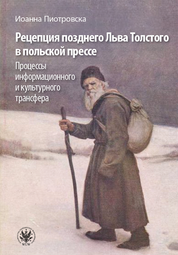Information about a product
| Edition: | 1 |
| Place and year of publication: | Warszawa 2021 |
| Publication language: | polski |
| ISBN/ISSN: | 978-83-235-5360-1 |
| EAN: | 9788323553601 |
| Number of page: | 270 |
| Size of the file: | 4,5 MB |
| Publication type: | Praca naukowa |
| DOI: | https://doi.org/10.31338/uw.9788323553526 |
The Ecology of Interdisciplinarity
A collective work of the researchers representing various academic disciplines, areas of expertise and fields of science as well as different generations, which aims to present interdisciplinarity as an essential element of research activity. The scholars share their experience and thoughts relating – directly or indirectly – to advantages and disadvantages of interdisciplinary practices.
Keywords: interdisciplinarity in science, interdisciplinary research, ecology of interdisciplinarity.
A collective work of the researchers representing various academic disciplines, areas of expertise and fields of science as well as different generations, which aims to present interdisciplinarity as an essential element of research activity. The scholars share their experience and thoughts relating – directly or indirectly – to advantages and disadvantages of interdisciplinary practices.
Keywords: interdisciplinarity in science, interdisciplinary research, ecology of interdisciplinarity.
Piotr Kulas, https://orcid.org/0000-0001-5917-0176
Anty anty-interdyscyplinarność. Ćwiczenie z socjologii wiedzy
https://doi.org/10.31338/uw.9788323553526.pp.57-68
Ewa Domańska, https://orcid.org/0000-00030875-976X
Biohumanistyka (rozpoznanie wstępne)
https://doi.org/10.31338/uw.9788323553526.pp.153-174
Jan Kieniewicz, https://orcid.org/
Dziki Mąż, krajobraz i perspektywa zwrotu ekologicznego
https://doi.org/10.31338/uw.9788323553526.pp.127-142
Jan Miernowski, https://orcid.org/
Ekologia interdyscyplinarności w świetle amerykańskiej debaty o nauce w dobie Trumpa oraz COVID-19
https://doi.org/10.31338/uw.9788323553526.pp.201-212
Rabiej Stanisław, https://orcid.org/0000-0003-3677-2128
Ekoteologia w dialogu z naukami przyrodniczymi i społecznymi
https://doi.org/10.31338/uw.9788323553526.pp.113-126
Marek Konarzewski, https://orcid.org/
Gaia 2.0 według Bruno Latoura
https://doi.org/10.31338/uw.9788323553526.pp.175-186
Maria Poprzęcka, https://orcid.org/
Historyk sztuki na bez-ludzkiej ziemi
https://doi.org/10.31338/uw.9788323553526.pp.81-98
Robert Sucharski, https://orcid.org/0000-0001-7708-7173
Homo qu(a)erens animal albo filolog między kulturą a naturą. Przypadek papugi
https://doi.org/10.31338/uw.9788323553526.pp.225-236
Joanna Pijanowska, https://orcid.org/0000-0001-5166-5748
Jak wiele jest ekologii?
https://doi.org/10.31338/uw.9788323553526.pp.23-32
Katarzyna Marciniak, https://orcid.org/
Lekcje latania, czyli ekologia interdyscyplinarności w programie „Our Mythical Childhood”
https://doi.org/10.31338/uw.9788323553526.pp.249-264
Alina Nowicka-Jeżowa, https://orcid.org/0000-0001-5917-9015
Małe itinerarium interdyscyplinarne (studium przypadku 1970–2020)
https://doi.org/10.31338/uw.9788323553526.pp.67-80
Maria Kalinowska, https://orcid.org/
Mieczysława Limanowskiego hermeneutyka miasta: Toruń
https://doi.org/10.31338/uw.9788323553526.pp.213-224
Piotr Matczak, https://orcid.org/0000-0002-8638-0141
Możliwości i trudności badań interdyscyplinarnych na przykładzie socjo-hydrologii
https://doi.org/10.31338/uw.9788323553526.pp.33-44
Tomasz Zarycki, https://orcid.org/0000-0003-2330-4499
O znaczeniu geografii jako nauki interdyscyplinarnej
https://doi.org/10.31338/uw.9788323553526.pp.45-56
Kalina Burnat, https://orcid.org/0000-0002-1157-9228
Poza centrum uwagi: doświadczenie uczenia w szkole i w laboratorium neurobiologa
https://doi.org/10.31338/uw.9788323553526.pp.237-248
Krzysztof Skonieczny, https://orcid.org/0000-0003-3935-6357
Recepcja koncepcji symbiogenezy Lynn Margulis w nowym materializmie na podstawie tekstów Donny Haraway i Myry Hird
https://doi.org/10.31338/uw.9788323553526.pp.143-152
Paweł Golik, https://orcid.org/
Różnorodność i równość w epoce genomu
https://doi.org/10.31338/uw.9788323553526.pp.187-200
Monika Stobiecka, https://orcid.org/0000-0003-3774-6159
Słonie Dalego. Ćwiczenie z archeologicznej wyobraźni
https://doi.org/10.31338/uw.9788323553526.pp.99-112
Anty anty-interdyscyplinarność. Ćwiczenie z socjologii wiedzy
https://doi.org/10.31338/uw.9788323553526.pp.57-68
Ewa Domańska, https://orcid.org/0000-00030875-976X
Biohumanistyka (rozpoznanie wstępne)
https://doi.org/10.31338/uw.9788323553526.pp.153-174
Jan Kieniewicz, https://orcid.org/
Dziki Mąż, krajobraz i perspektywa zwrotu ekologicznego
https://doi.org/10.31338/uw.9788323553526.pp.127-142
Jan Miernowski, https://orcid.org/
Ekologia interdyscyplinarności w świetle amerykańskiej debaty o nauce w dobie Trumpa oraz COVID-19
https://doi.org/10.31338/uw.9788323553526.pp.201-212
Rabiej Stanisław, https://orcid.org/0000-0003-3677-2128
Ekoteologia w dialogu z naukami przyrodniczymi i społecznymi
https://doi.org/10.31338/uw.9788323553526.pp.113-126
Marek Konarzewski, https://orcid.org/
Gaia 2.0 według Bruno Latoura
https://doi.org/10.31338/uw.9788323553526.pp.175-186
Maria Poprzęcka, https://orcid.org/
Historyk sztuki na bez-ludzkiej ziemi
https://doi.org/10.31338/uw.9788323553526.pp.81-98
Robert Sucharski, https://orcid.org/0000-0001-7708-7173
Homo qu(a)erens animal albo filolog między kulturą a naturą. Przypadek papugi
https://doi.org/10.31338/uw.9788323553526.pp.225-236
Joanna Pijanowska, https://orcid.org/0000-0001-5166-5748
Jak wiele jest ekologii?
https://doi.org/10.31338/uw.9788323553526.pp.23-32
Katarzyna Marciniak, https://orcid.org/
Lekcje latania, czyli ekologia interdyscyplinarności w programie „Our Mythical Childhood”
https://doi.org/10.31338/uw.9788323553526.pp.249-264
Alina Nowicka-Jeżowa, https://orcid.org/0000-0001-5917-9015
Małe itinerarium interdyscyplinarne (studium przypadku 1970–2020)
https://doi.org/10.31338/uw.9788323553526.pp.67-80
Maria Kalinowska, https://orcid.org/
Mieczysława Limanowskiego hermeneutyka miasta: Toruń
https://doi.org/10.31338/uw.9788323553526.pp.213-224
Piotr Matczak, https://orcid.org/0000-0002-8638-0141
Możliwości i trudności badań interdyscyplinarnych na przykładzie socjo-hydrologii
https://doi.org/10.31338/uw.9788323553526.pp.33-44
Tomasz Zarycki, https://orcid.org/0000-0003-2330-4499
O znaczeniu geografii jako nauki interdyscyplinarnej
https://doi.org/10.31338/uw.9788323553526.pp.45-56
Kalina Burnat, https://orcid.org/0000-0002-1157-9228
Poza centrum uwagi: doświadczenie uczenia w szkole i w laboratorium neurobiologa
https://doi.org/10.31338/uw.9788323553526.pp.237-248
Krzysztof Skonieczny, https://orcid.org/0000-0003-3935-6357
Recepcja koncepcji symbiogenezy Lynn Margulis w nowym materializmie na podstawie tekstów Donny Haraway i Myry Hird
https://doi.org/10.31338/uw.9788323553526.pp.143-152
Paweł Golik, https://orcid.org/
Różnorodność i równość w epoce genomu
https://doi.org/10.31338/uw.9788323553526.pp.187-200
Monika Stobiecka, https://orcid.org/0000-0003-3774-6159
Słonie Dalego. Ćwiczenie z archeologicznej wyobraźni
https://doi.org/10.31338/uw.9788323553526.pp.99-112
Zobacz również

Update Required
To play the media you will need to either update your browser to a recent version or update your Flash plugin.







